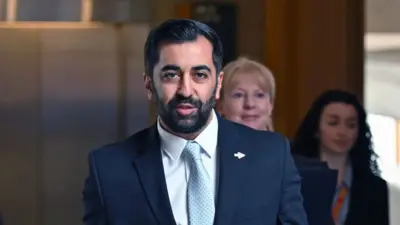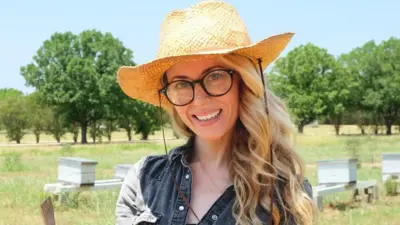We've updated our Privacy and Cookies Policy
We've made some important changes to our Privacy and Cookies Policy and we want you to know what this means for you and your data.
'Surrogacy is absolutely what I want to do'
- By Jo Deahl
- BBC News
Image source, Getty Images
The number of parents having a baby using a surrogate in England and Wales has almost quadrupled in the last 10 years, new figures show.
Parental orders, which transfer legal parentage from the surrogate, rose from 117 in 2011 to 413 in 2020.
Two-thirds of applicants are now mixed-sex couples often in their 30s or 40s.
The report is by the University of Kent and My Surrogacy Journey, a non-profit organisation which supports surrogates and intended parents.
Surrogacy is when a woman carries a pregnancy for another couple or individual. In most cases it is because someone cannot carry a pregnancy themselves for health reasons or because they are men in a same-sex relationship.
As it becomes more common, experts say the UK law on surrogacy - in place since 1985 - is outdated and leaves both surrogates and intended parents vulnerable.
The law states a surrogate is deemed the legal mother when the baby is born - irrespective of genetics or any agreements that have been made.
A parental order must be made to transfer legal parentage to the intended or biological parents.
And it is illegal to advertise for a surrogate - meaning unless family or friends offer, intended parents can struggle to find a match.
Image source, The Life Narrator - Hannah Lamprell
Non-profit organisations and social media sites say they are seeing more people using their services to help match surrogates and would-be parents.
Two women who met on a Facebook group were Fran and her surrogate Gina.
Fran, 39, from Stockton-on-Tees, needed a surrogate to carry her two daughters, Evelyn and Grace, after cervical cancer treatment meant she could not carry a pregnancy herself.
"My consultant told me about a woman like me who was now a mum and she was my goal," said Fran. "I want to put my story out there to show others that normal real-life women get through this and take their own baby home.
"I can't think of a better way of women empowering women."
She said those using surrogates in order to have a family are "just normal people, teachers, people who re-mortgage their houses to do this".
"When you're given a cancer diagnosis your whole life changes in a second and you fall into this hole, and the fog just descends," Fran told the BBC.
"And then when Evelyn was born it felt like for the first time since that diagnosis this weight had been lifted and I could start to think about life again."
Gina, 45, Fran's surrogate, runs one of the many Facebook groups where surrogates and intended parents match.
She believes more people are considering surrogacy, in part down to celebrities such as Robbie Williams and Kim Kardashian talking so openly about their own experiences.
"We have over 1,000 members currently," she said. "Across independent groups there have been over 40 babies born in 2019 alone."
Gina backs changing the law so that those who have a baby with a surrogate become the legal parents "from the minute that baby is born".
"I don't want the parental rights to someone else's child. I never went into this to have another baby of my own. I've got three beautiful children of my own. It was all about creating a family for someone else. I don't want to be a mum to someone else's child," she said.
Image source, Family photo
Natalie is mum to two children and is now 30 weeks pregnant with her first surrogate baby.
The 34-year-old, from Bath, said: "We struggled starting our own family - we had a miscarriage and a still birth.
"My daughter Sophie was born at 37 weeks but tragically she died. A friend had had breast cancer and I'd offered to be a surrogate for her if she needed. She didn't, but it was always in the back of my mind."
She added she was driven to help others who wanted to have a child but could not.
"I was watching The Nest [a TV drama featuring surrogacy] during lockdown and I felt so sorry for them," she said. "I spoke to my husband and we talked about if I could deal with being a surrogate after losing our daughter, so I spoke to my GP and a bereavement nurse who were supportive.
"I met my intended parents on the Facebook groups and we chatted for a year before matching."
Image source, Family photo
Department of Health guidance said it does not generally recommend that those considering surrogacy do so independently on sites like Facebook, instead pointing to one of the four UK non-profit organisations.
The trouble is those organisations have long waiting lists.
Natalie Gamble is director of Brilliant Beginnings - another non-profit organisation in the UK which matches surrogates and intended parents.
"We get around 100 enquiries a month from women who want to be surrogates and that's risen considerably in the past few years," she said. "Unfortunately, there are still more intended parents looking for a match than we can help."
Image source, Family photo
Megan, 25, from Ipswich looked into becoming a surrogate when she was furloughed during lockdown. She is currently getting to know two sets of intended parents she met through a surrogacy organisation.
"Me and my fiancé Ed are childless by choice - we've always known we don't want children," she said. "But if I have the ability why wouldn't I help someone else?
"My best friends totally get it - my parents and older family members not so much. My mum's main concern was she wanted me to have my own kids but they're both really supportive. I've donated eggs twice and this is absolutely what I want to do."
- Surrogacy is legal in the UK. However, it is illegal to advertise for a surrogate and it is illegal for third parties to profit from matching
- Surrogacy arrangements in the UK are regulated by the Surrogacy Arrangements Act 1985 and the Human Fertilisation and Embryology Act 2008
- In the US commercial surrogacy is legal in many states, but it can cost vast sums
- The NHS does not fund surrogacy arrangements
- The Department of Health lists the four main UK surrogacy organisations - COTS, Brilliant Beginnings, My Surrogacy Journey and Surrogacy UK
The legislation relating to surrogacy is UK-wide, but there are different judicial systems in Scotland and Northern Ireland. The Department of Health guidance only applies to England and Wales.
In the US where surrogacy is more common and highly regulated, intended parents can go on to the birth certificate as soon as the baby is born - and payments of tens of thousands of pounds to surrogates are common.
Commercial surrogacy is illegal in the UK, so a third party cannot profit from matching people. But it is not illegal for a surrogate to be paid expenses - non-profit organisations say between £12,000 and £20,000 is the average for such expenses, but there is no limit.
The government agrees the surrogacy law in the UK needs to change and has asked the Law Commission of England and Wales along with the Scottish Law Commission to review it.
Professor Nick Hopkins is the Law Commissioner for family law, and is one of the proponents leading the consultation.
"When we asked whether surrogacy law needed review we received one of our largest volume of responses. The law does need updating.
"We're looking at the idea that legal parentage would start not with a parental order but at birth. But it is fundamental to our review that the surrogate must retain her bodily autonomy throughout and a surrogacy agreement would not be enforceable if a surrogate withdrew her consent - which is extremely rare."
A Department of Health and Social Care spokesperson said: "We know surrogacy is an important option for families and we remain committed to reforming legislation to ensure more certainty for surrogates and intended parents."
The Law Commission will publish its recommendations for reform of the law and a draft bill towards the end of 2022.
Top Stories
Features & Analysis
Most read
Content is not available








